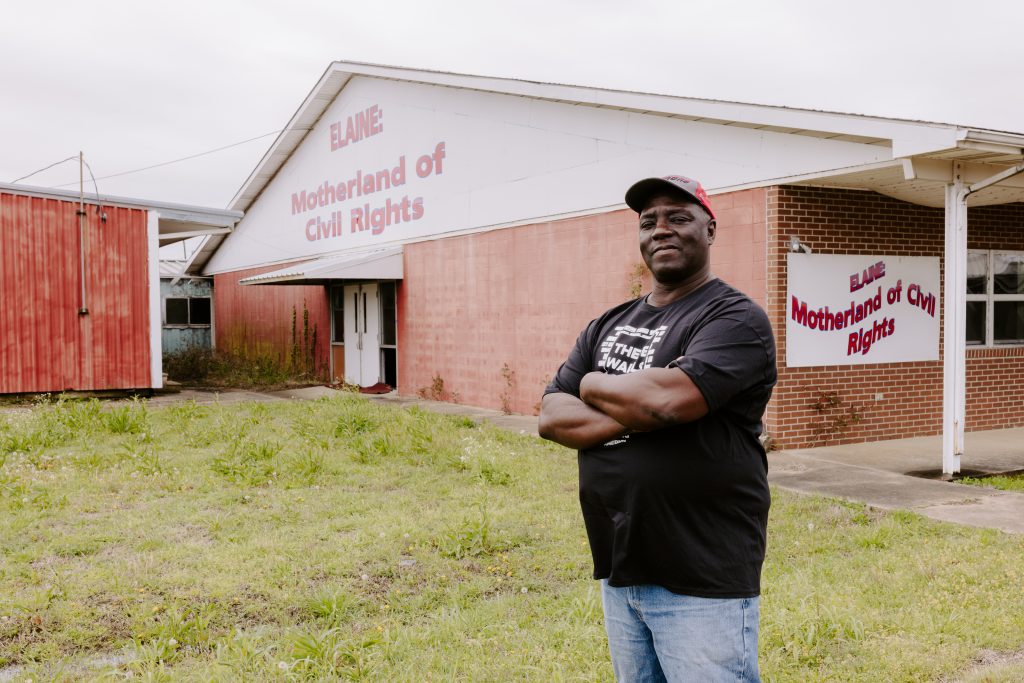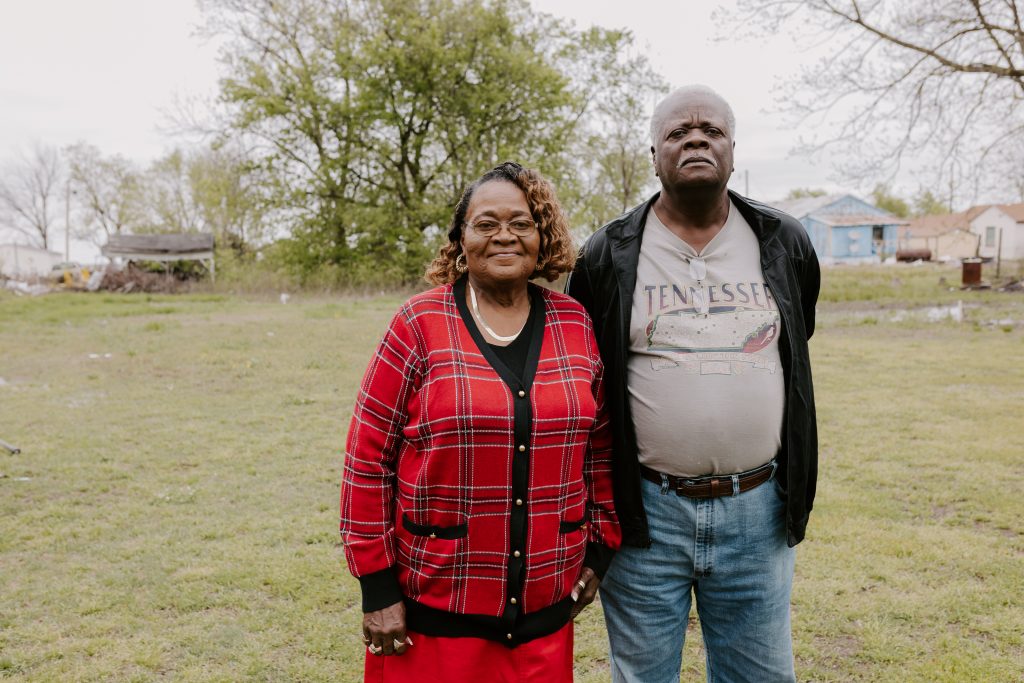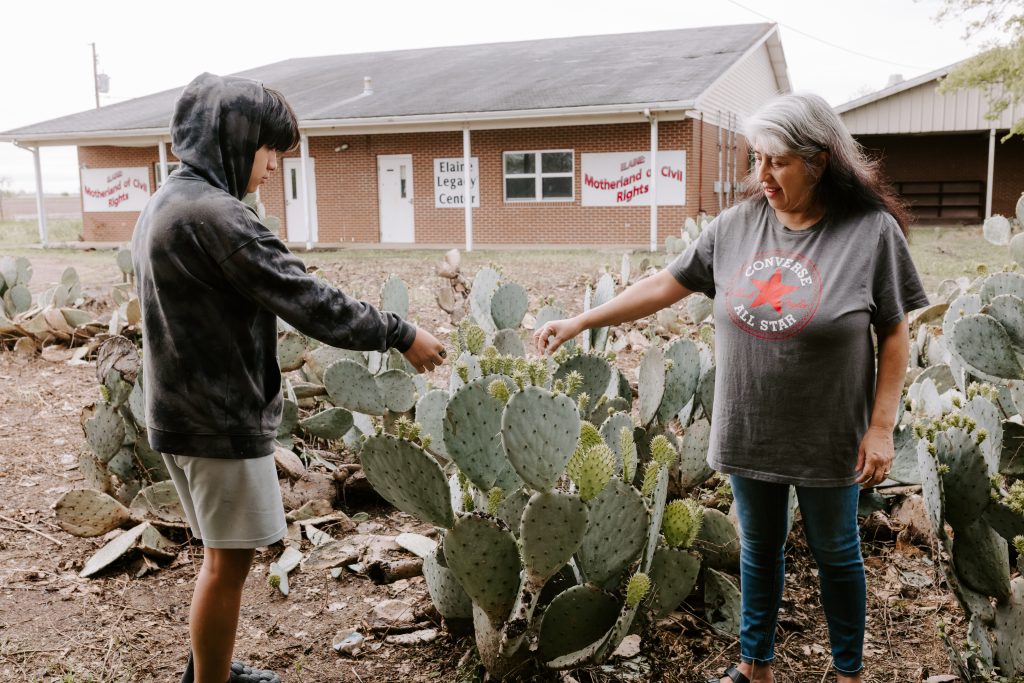By Kim Dishongh
The landscape is changing in and around Elaine in Phillips County, as unkempt, often litter-strewn vacant lots are being replaced by neat rows of peas, peppers, tomatoes and more.
It makes for a more appealing view. Aesthetics aside, this evolution is helping to educate, employ and nourish residents of the little Arkansas Delta town.
James White, director of the Elaine Legacy Center, has made it his mission to improve life for the 600 or so residents of Elaine. One way to do that, he hopes, is to encourage people who own vacant lots around town to allow the Legacy Center to clear them, till them and find people to turn them into gardens.

White grew up helping his grandparents on their farm, and he formed lasting memories around the fresh produce they grew there.
“Back then, you lived off of your garden. Everybody around here used to have one,” he said. “They don’t anymore. People stopped doing that some time back.”
Not only are fewer people in Elaine growing fresh produce themselves, they often run into challenges buying it.
“From Elaine, we have to drive 20 or 30 minutes to get to a grocery store where we can get fresh vegetables,” he said. “There’s not anywhere here you can just go buy stuff like that.”
Dr. Mary Olson, spokesperson for the Legacy Center, said access to fresh whole foods is one issue, and so is poverty. Fresh produce costs more – and spoils faster – than packaged foods. People may not be able to afford the higher-priced, albeit healthier foods, and they also may not have the time or kitchen tools to prepare it.

“The mission of the Legacy Center is two-pronged,” Olson said. The nonprofit was formed by descendants of Black Elaine residents who were killed during violence that erupted in 1919 as Black workers sought to receive better payments for the crops they harvested.
“It is, first of all, the research, preservation and sharing of the oral histories of Elaine on which to build a foundation for a poverty-free Elaine. It is also a service wing to Elaine right now that recognizes that most of the people are in poverty, and while people are still in poverty, as we wait for the heritage and tourism to eliminate it, we serve as a community. So we are big time on closing the food gap, working with teenagers and doing what the community needs to have done – and wants to have done.”
Elaine Legacy Center supporters have traditionally grown collard greens, purple hull peas and okra on their own grounds and have given much of that produce to people in the community. They also have several plots of cacti.

“Cactus is the healthiest vegetable known to humanity,” Olson said. “It is niched in the Hispanic Mexican culture and because we have a strong Hispanic population with whom we work, we started growing cactus.”
The flavor, she said, is similar to green beans, and it can be roasted, eaten raw in a salad, boiled or juiced.
“One of our goals is to get it out of just the Hispanic culture and into the general public,” said Olson.
White started a farmers’ market in Elaine where smallholder farmers working in the vacant lot initiative could sell their harvests — and where Elaine residents could buy fresh fruits and vegetables locally. To increase the diversity of the market, White has occasionally traveled to other parts of the Delta to pick up produce to offer patrons. His goal is to support the farmers in the program to diversify their crops so they can grow the crops that are most in demand.
“We’re also planning for teenagers to work in the gardens this summer,” Olson said. “We are hoping that this will be so successful that some of our young people can get agricultural degrees while they are growing vegetables to make a profit. Then they can come back to Elaine earning enough money in this kind of vegetable production to make a better income here than they would make going somewhere else. So, we have high hopes for this.”

Scottie Smith of Lexa has helped plow gardens for the Elaine Legacy Center for several years. For the last couple of years, he has tended gardens of his own as well.
“I started doing it because other people had asked me to till up gardens for them,” said Smith, whose gardens are in Helena. “I had a couple of acres so I decided I would start doing it myself, too.”
Smith’s paternal grandparents farmed, and he worked on farms growing up.
“But I wasn’t growing anything when I worked on the farm,” he said. “I was cutting and chopping and stuff like that, but I didn’t know anything about the planting. I’m still learning that now.”
Smith, whose full-time job is driving trucks for the city of Helena/West Helena, is growing cucumbers, squash, greens, tomatoes, peppers and watermelons, and he also raises chickens. He shares produce and eggs with people in his area who he knows need them. The pandemic and subsequent inflation have created hardships for many, he knows.
“I get to help,” Smith said. “I just try to help people get fresh vegetables in the area because there’s a lack of it here. I try to sell, and sometimes I just give it to them. Outside of that, we just try to feed our family here and keep them healthier.” Smith enlists the help of his 10-year-old son, and he hopes he will learn along with him.
“I want to make money, too, and Dr. Olson introduced me a couple of weeks ago to a guy that proposed to help us sell food to the food bank,” said Smith. “We’re looking at planting a couple of acres of just peas. I don’t know yet how that’s going to go.”
Olson expects to see more vacant lot farms this year, as well as growth in some put in in years past. There will also be a few new gardens outside Elaine, she said.
“All of us at the Elaine Legacy Center are grateful for the two years of funding from Arkansas Community Foundation,” Olson said. “This funding allows us to strengthen vacant lot farming in Elaine and expand it to other places, as well as add collaborators.”
##
Elaine Legacy Center received an “Access to Local Foods” grant from Arkansas Community Foundation in 2022 to help increase Arkansans’s access to locally grown food.
